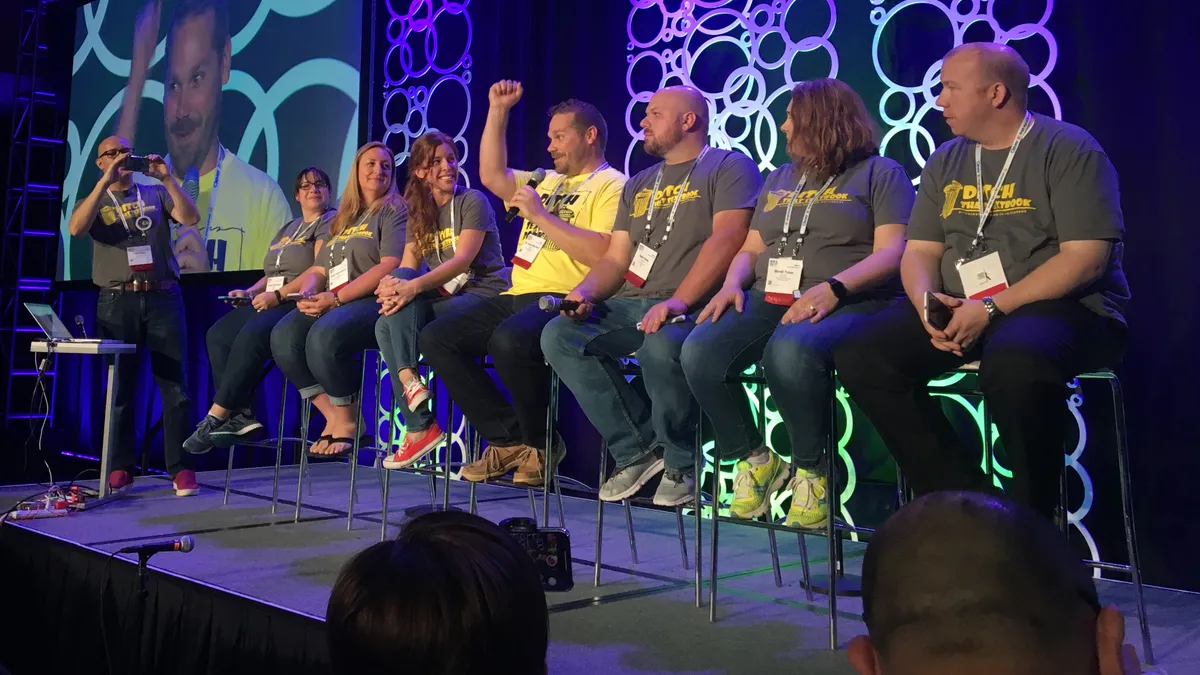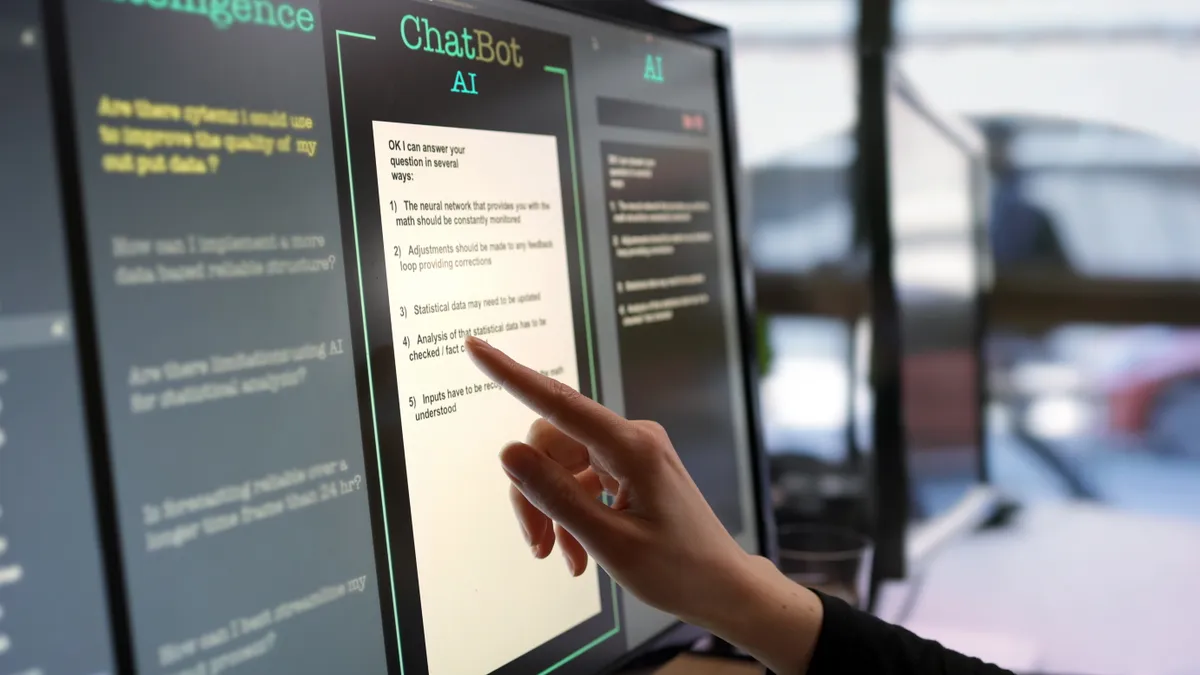Educators continued pouring into Chicago’s McCormick Place convention center Tuesday as ISTE 2018 continued with a morning keynote session featuring “The Martian” author Andy Weir, former Buck Institute for Education director of district leadership Katie Martin, and “The Tech Rabbi” Michael Cohen.
But before they could address the crowd, ISTE Board President Mila Thomas Fuller kicked the session off by acknowledging the 2018 ISTE Award winners, who can be found here. She then invited ISTE Chief Learning Officer Joseph South to the stage to discuss a number of the organization's projects.
South detailed ISTE’s new certification, which will help educators develop an e-portfolio of their best work and qualify them for graduate-level credit. But beyond that, he detailed the new ISTE U professional learning platform. More information on that is included below, and additional information is also available via the ISTE app under “new initiatives.”
Luis Perez, technical assistance specialist at the National Center on Accessible Educational Materials, told the crowd that his high school’s motto was “turn to the light,” which he said didn’t mean much to him until he was diagnosed with visual impairment as an adult. He joked that it comes in handy sometimes, though — like when he has to speak to large crowds like this one, because he can’t see most of them.
Perez shared a poem that he wrote, titled “Entre/Between,” describing his experience living “between and betwixt,” both being neither fully sighted or fully blind and as an immigrant. He said that as people with complex identities, we should all be valued — something especially important in education.
We all have complex identities that should be valued and incorporated into education #iste18 pic.twitter.com/pEGwwjbkQD
— Sarah Olson (@Sa_rah_Olson) June 26, 2018
Following Perez’s speech, Fuller returned to the stage to introduce Weir, who sat down for a conversation with Northern Illinois University’s Gillian King-Cargile, founder of STEM Read. Weir told King-Cargile that he was a “canonical nerd” who was bullied as a student, but was also disruptive because he was bored a lot.
“I was good on paper,” he joked.
What a treat! @andyweirauthor is delightfully funny, wildly clever, absolutely adorable. Love seeing a SciFi author crushing it in the world of books and movies. Thanks @iste! #ISTE18 #STEM #publishing #EDPiper pic.twitter.com/npFegVfInp
— Cindy Woody (@woody_cindy) June 26, 2018
At the age of 15, he began doing software development in a national lab in California. The lab hired local teens to clean test tubes and other things. “It wasn’t like I was some sort of mega-genius or anything,” he said, but they needed data analyzed and gave him a computer and a book on how to program computers.
“That began a 25-year career in software engineering for me,” he said, adding that he continues to love learning because he enjoys the process of learning new things. But he goes out of his way to avoid approaching problems and finding solutions in the same way others have.
When asked about the problem solving in his books, "You should write a book that you yourself want to read... And I like problem solving." @andyweirauthor #ISTE18 pic.twitter.com/EZMhbnYlRE
— Miranda Kerr (@MirandaRHK) June 26, 2018
Next, Martin, whose new book is titled “Learner Centered Innovation,” took the stage to address the crowd, adding that she was devastated last year when she couldn’t attend the show in San Antonio.
She detailed how her two elementary school-age children have been scientists since learning how to make soap as children, but her daughter was deemed “needs improvement” in science because she didn’t complete part of a packet for compliance, despite interest in the subject. The expectations to assess and document learning are often at odds with what produces authentic learning, she said. Compliance deadlines can also impair administrators when it comes to supporting educators and helping them improve their craft.
"Empower learners to discover their passions and share their ideas with the world" @katiemartinedu #ISTE18
— Duke Lines (@duke_lines) June 26, 2018
Ultimately, these are issues that come with the industrial model of education that must change with our post-industrial world. Students must be presented with meaningful, authentic, challenging problems to solve. Technology isn’t the silver bullet, she said, as it must come with a redefining of goals and strategies to truly engage students and prepare them for the future.
Educators have an obligation to confront traditions and create new and better experiences for the learners they serve, she told the crowd. These experiences must become learner-centered, tying to students' personal experiences and providing agency, critique, collaboration and more.
What kind of learner centered experiences are we creating for our students? #iste18 #keynote https://t.co/HYJJVaBJRD pic.twitter.com/8SGZJTDuju
— Margaret Sisler (@TechyMargaret) June 26, 2018
Finally, Cohen — a designer, educator and "creativity instigator" — told the crowd about an email he received from a student. The student had thought of an idea for an invention but dismissed the thought because they didn't think it was possible, but then thought of how Cohen had inspired him not to dismiss creativity and asked if they could speak in school that day.
I’ve also been inspired by @TheTechRabbi just like this student. #iste18 #inspired pic.twitter.com/g5cNJ5NAhc
— George Garcia (@edtechchamp) June 26, 2018
Cohen said that a lack of creative confidence impacts students' creative capacity and belief in themselves. Not enough time is given to allow students to engage with the "abstract, unknown and unscripted." Belief in yourself, others and something bigger than us is key to students having the space to experiment, take risks, and leverage that knowledge to do something about their light bulb moments.
Edison, he said, didn't set out to invent the light bulb itself — he wanted to give the world a way to see in the dark. Education is a convergence of a career, a calling, a cause and potential, and educators must set out to help students find that sort of convergence in their own paths, whatever that may be.
"Sometimes our creativity is purged by the fear of being judged by others," he said.
#ISTE18 Michael Cohen’s message of having students believe in themselves and having teachers believe in each other and their students is powerful.
— WillRod (@willrod718) June 26, 2018
ISTE U launches to provide online professional learning opportunities
Tuesday morning included the announcement of ISTE U, a professional learning hub for teachers and administrators built in collaboration with D2L on the BrightSpace learning management system. ISTE U will offer professional learning opportunities in online courses focused around topics that include digital citizenship, artificial intelligence and computational thinking.
According to a press release, the initial courses available now include:
- Taking Mobile Learning to the Next Level
- Artificial Intelligence Explorations and Their Practical Use in Schools
- Digital Citizenship in Action
- Introduction to Computational Thinking for Every Educator, developed with support from Google
- Exploring Future Ready Librarianship: Practices for the Emerging Leader, developed in collaboration with Future Ready Librarians™ and with support from Follett
- Exploring the Why and What of Personalized Learning, developed in collaboration with LEAP Innovations
- Selecting the Right Tech Solutions for Your Classroom, developed in collaboration with Mathematica
- Best Practices in Open Education Resources, developed in collaboration with iLearn Collaborative
- Learning Differences I: Understanding Learning Differences, developed in collaboration with The FridayInstitute
- Learning Differences II: Unpacking Learning Differences, developed in collaboration with The FridayInstitute
- Taking the Lead to Support Innovative Instructional Models, developed in collaboration with Highlander Institute
Additional courses will be developed with new partners over time, and a partnership with Dominican University of California will also offer graduate-level credit eligibility for ISTE U courses at an additional fee.
ISTE and GM unveil AI partnership
ISTE and General Motors are collaborating on a multi-year effort to offer professional learning opportunities and hands-on, school-based pilots around the use of artificial intelligence (AI) in education.
Work on the effort began in September 2017 and has so far impacted over 25 districts, with educators in Arizona, California, Georgia, Illinois and Michigan, for example, completing a new 10-week online course on the learning and problem-solving benefits of AI. Additionally, educators in Massachusetts, New Jersey, Oregon, Virginia and Wisconsin are already tasking students with programming an AI chatbot to solve a classroom or schoolwide need.
The effort will also aim to produce an AI and STEM Career Exploration Network with higher education and industry partners. That network will work to expose educators to R&D for AI and machine learning, career awareness explorations for computer science and engineering, hands-on workshops and mentorship, and opportunities to network with industry experts.
In a press release, ISTE CEO Richard Culatta was quoted as saying the goal is to “shift students from consumers of AI technologies to creators of AI technologies that address real problems.”
Panel encourages educators to 'DITCH' that textbook
In a packed afternoon session, educator and "Ditch That Textbook" author Matt Miller led a group of seven educators and administrators through a discussion of how they ditched their textbooks and rethought their approaches to teaching — with "DITCH" pulling double-duty as an acronym for "Different, Innovate, Tech-Laden, Creative, Hands-On."
This amazing #DitchPanel should have been our #ISTE2018 #KeynoteSpeaker #ditchbook pic.twitter.com/G9xpskiSmc
— Rhesa (@missrhesa) June 26, 2018
On hand were Sean Fahey, math teacher at Paoli Community Schools (Ind.); Rayna Freedman, 5th grade teacher at Jordan/Jackson Elementary in Mansfield (Mass.); Krista Harmsworth, 5th grade teacher at Keith Elementary/Walled Lake Schools (Mich.); Tara Martin, a consultant and former district administrator at Auburn Washburn USD 437 (Calif.); Dr. Lance McClard, principal at North Elementary/Jackson R2 (Mo.); Evan Mosier, 6th grade language arts teacher at Sudlow Intermediate School (Iowa); and Mandi Tolen, math teacher at Central High School/SJSD (Mo.).
@TaraMartinEDU this is exactly the face I make each time someone approaches me requesting a traditional textbook adoption. You speak to my heart and my reality. We can do this better, our teachers can do this better. Our students deserve better. #ditchpanel #ISTE18 @jmattmiller pic.twitter.com/5gbCwVxoBL
— Sarah J. Hickle (@SJHickle) June 26, 2018
The "DITCH" concept initially came when Miller, a career high school Spanish teacher who was frustrated with the fact that textbooks weren’t getting the job done, harnessed Twitter to take advantage of the power of community and build a network around a #Ditchbook hashtag, which is still used to facilitate discussions. A full rundown of resources and strategies from the panel is available here.
Surely this is the first time I’ve ever heard “choose your own adventure story” and “math” in the same sentence! ???? #boom Using Flipgrid with kids from other schools in response to their math stories. #ISTE18 #ditchpanel #math pic.twitter.com/fABbn7ydgV
— Cindy Woody (@woody_cindy) June 26, 2018
When you see an example from another subject- think, how can I adapt for my class? #DitchPanel #iste18
— Dan James (@djniner) June 26, 2018
Failure is not fun, but we all deal with it. It's part of teaching and it helps us evolve as educators. #ISTE18 #ditchbook #ditchpanel pic.twitter.com/p7JtQNOF19
— Jacqueline Prester (@MrsPrester) June 26, 2018
In case you were wondering - here are @TaraMartinEDU 's resources on how to do a booksnap - https://t.co/q3FUeRxT2r Learned during my @iste #ETCoaches book study! #ditchpanel #ISTE18
— Carol A. Persin (@TheITPersin) June 26, 2018
Tech integration specialists discuss challenges with implementation
In another afternoon session, Jeremy Shorr of the Teaching Institute for Excellence, led technology coaches including Mia Leonard of National Teachers Academy (Ill.), Allison Thompson of Lansing School District (Mich.), David Hayward of Pickerington Local School District (Ohio), Katie Siemer of Forward Edge, and Gregory Gilmore of Osage Trail Middle School (Mo.) in a conversation about their strategies and best practices.
Stay tuned over the next few days for a full recap.
Funds For Learning E-Rate Trends Report emphasizes program's ongoing value
- Funds For Learning on Tuesday issued the results of its eighth annual E-Rate Trends Report, stressing the ongoing value the Federal Communications Commission program provides to schools and libraries.
- A total of 88% of the around 1,025 applicants who responded reported that E-rate funding is critical to connecting students and library patrons with reliable high-speed broadband, that 51% of networks will require upgrades in the next three years, and that 88% of schools want a simplified approach with flexibility to choose specific school buildings to target for Wi-Fi support.
- Additionally, 74% want E-rate support for backup internet connections, with only 13% saying they can currently afford backup internet.
Students in Chicago see significant growth via Achieve3000 literacy program
- Differentiated learning facilitator Achieve3000 is touting academic gains made by Chicago Public Schools students using its program.
- According to a release, 2017-18 school year data show that students using Achieve3000 were only at 1% “meeting or exceeding” and 6.1% “approaching” college and career readiness in August 2017, but by April 2018, those numbers had risen to 18% and 32.7% respectively.
- The release focuses on literacy improvement in particular, citing an average gain of 185 Lexile points at Richard Edwards Elementary, where over 90% of the 1,546-student school’s learners are low-income and 49% are English learners.























